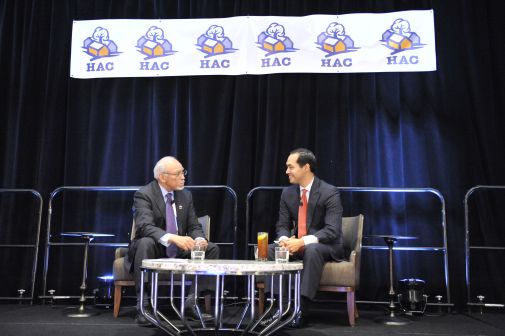Groups Urge HUD and USDA to Finalize Efficiency Requirements for U.S.-Backed Homes
A federal proposal to ensure new homes supported by U.S.-backed mortgages and federal housing programs meet updated energy efficiency criteria garnered widespread support from stakeholders today. Groups advocating for affordable housing, energy efficiency, and climate mitigation united in urging the administration to finalize the action promptly.
The groups were joined by more than 6,000 individuals across the country who supported the proposal in public comments gathered by Sierra Club and submitted to regulators today.
The U.S. Department of Housing and Urban Development (HUD) and Department of Agriculture (USDA) proposed updating their efficiency requirements in May by issuing a preliminary determination. If the action is finalized, future residents of the homes at issue compared to homes under the current criteria will save an estimated $14,500 for single-family homes and $6,000 per multifamily unit overall, net of costs, over the lifetime of the homes thanks to lower energy bills, HUD and USDA calculated. It would avert 2 million metric tons of carbon dioxide emissions for each year of new homes, the agencies said.
Jonathan Harwitz, director of public policy at the Housing Assistance Council, said: “Keeping housing affordable includes making utility costs affordable. We encourage HUD and USDA to move forward with this determination, and also to find ways to help cover upfront costs and to educate those who finance and build affordable housing.”
Lowell Ungar, federal policy director at the American Council for an Energy-Efficient Economy, said: “The longer we build brand-new inefficient homes, the more needless energy costs and climate pollution we’ll see for decades ahead. Just by meeting their legal mandate, the agencies will help ensure tens of thousands of new homes have lower energy bills and less risk of spiking costs. The analysis is clear; now they need to act promptly to get the job done.”
Jessica Tritsch, building electrification campaign director at the Sierra Club, said: “Too often renters and folks in low-income housing are left behind from programs that offer energy efficient housing and lower utility bills. This move by HUD will help ensure better access to climate-friendly appliances and healthier, more affordable homes. Adopting these new energy efficiency building codes is long overdue. We are committed to holding HUD, and other federal and state agencies, accountable to help low-income homeowners and renters access clean, safe, energy efficient housing.”
Background:
In bipartisan laws in 1992 and 2007, Congress directed HUD and USDA to periodically strengthen efficiency criteria for new homes purchased with federally backed loans such as Federal Housing Administration (FHA) and USDA mortgages, along with new homes with funding from other HUD programs, like the HOME Investment Partnerships grants for affordable housing. These homes—about 200,000 new ones each year—are primarily for low- and moderate-income homeowners and renters.
These criteria follow a model building energy code known as the International Energy Conservation Code (IECC) for single family houses and smaller multifamily buildings, and ASHRAE Standard 90.1 for high-rise multifamily buildings. The law requires HUD and USDA to update the criteria when the codes are updated every three years as long as the agencies determine that doing so would not negatively affect the availability or affordability of covered housing. But the regulators have not updated the criteria since 2015.
The agencies finally issued a preliminary determination for public comment in May for the 2021 IECC and Standard 90.1-2019 (the current requirements are the 2009 IECC and 90.1-2007). A provision in the omnibus spending bill enacted at the end of 2022 also requires the Department of Veterans Affairs to update its loan requirements based on the HUD-USDA criteria.
Houses and multifamily buildings meeting these criteria generally have more insulation in the walls and roofs, better air sealing and windows, and more energy-efficient systems, including better-sealed ducts. The homes waste less heat and allow more efficient heating and cooling with smaller HVAC systems.
Today is the final day for stakeholders to comment on the preliminary determination. When the agencies issue a final determination, they will implement the updated efficiency criteria in each covered program over a few months.
Media contacts:
ACEEE – Ben Somberg, 202-658-8129, bsomberg@aceee.org
HAC – Dan Stern, 202-516-6882, dan@ruralhome.org
Sierra Club – Shannon Van Hoesen, 202-604-2464, shannon.vanhoesen@sierraclub.org
The American Council for an Energy-Efficient Economy (ACEEE), a nonprofit research organization, develops policies to reduce energy waste and combat climate change. Its independent analysis advances investments, programs, and behaviors that use energy more effectively and help build an equitable clean energy future.
The Housing Assistance Council (HAC) is a national nonprofit that supports affordable housing efforts throughout rural America. Since 1971, HAC has provided below-market financing for affordable housing and community development, technical assistance and training, research and information, and policy formulation to enable solutions for rural communities.
The Sierra Club is America’s largest and most influential grassroots environmental organization, with millions of members and supporters. In addition to protecting every person’s right to get outdoors and access the healing power of nature, the Sierra Club works to promote clean energy, safeguard the health of our communities, protect wildlife, and preserve our remaining wild places through grassroots activism, public education, lobbying, and legal action.





 The Housing Assistance Council is pleased to announce that
The Housing Assistance Council is pleased to announce that 